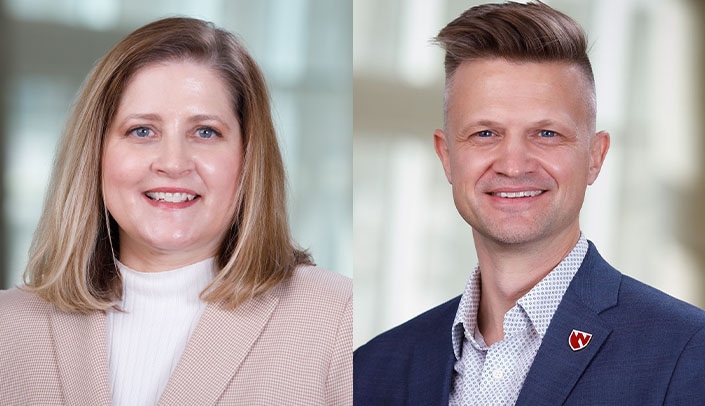As faculty, staff and students return to campus for the fall semester, COVID-19 data supports continued precautions to best protect in-person learning, business operations and our clinical partners.
"For some time, we have been seeing higher transmission rates across the U.S. and increasing rates of hospitalizations," said Jane Meza, PhD, interim executive director for the UNMC Office of Health Security. "As we move into the fall, we will continue to take safeguards to best protect our patients, students and employees."
"For now, current trends support the continued use of masks to keep our health care system viable and protect in-person learning and staffing," said John Lowe, PhD, assistant vice chancellor for health security training and education at UNMC and executive director of education for the Global Center for Health Security. "As an academic health sciences center, it’s important that we take appropriate precautions to protect our patients, colleagues and the next generation of health care providers."
Precautions are warranted, Dr. Lowe said, because:
- Community risk levels are climbing and higher than this time last year;
- Test positivity rates on campus are greater than 10% and climbing; and
- COVID-19 hospitalizations are increasing, and overall hospital capacity is strained.
UNMC leaders say they will revise masking practices once established COVID-19 benchmarks are met; until then, here is a quick reminder of current COVID safety practices:
Masks. Surgical or KN95 masks must be worn in all public, common and patient-facing areas across all UNMC campuses. They are not required when alone in an office or room with a closed door, in individual library study rooms, or when eating indoors if distanced, or outdoors.
- For conference rooms and auditoria, individuals can unmask if the number in the room is 40% or less of the room capacity and all individuals are socially distanced. Socially distanced room capacities for some rooms are available online.
- Lecturers are not required to wear a mask if it significantly interferes with their ability to be heard or understood. If no mask is worn to optimize the learning environment, lecturers must have at least six feet distance from others.
Saliva PCR and nasal swab testing. Testing is available on the Omaha campus for free for UNMC faculty, staff and students who are not sick and want to be tested for COVID-19 for any reason. See details including testing options for campuses outside of Omaha.
Self-screening app. Download the free 1-Check UNMC app — created exclusively for the UNMC community — to self-screen for COVID-19 symptoms. See details.
Vaccine boosters. Faculty, staff and students are strongly encouraged to receive all booster doses for which they are eligible. Information on booster doses is available on the Centers for Disease Control and Prevention website. Walk-in doses, including for the recently authorized Novavax vaccine, are available at Nebraska Medicine pharmacy locations or can be scheduled at some of Nebraska Medicine’s health centers. Details are available on the Nebraska Medicine website.
What if I test positive? As an academic medical center, UNMC follows CDC guidelines for health care personnel regarding isolation and quarantine after a positive test or exposure. If you have been exposed to COVID-19 and are experiencing symptoms, it is recommended that students contact the Student Health clinic serving their campus and employees contact Employee Health at 402-552-3563 and their supervisor for guidance on returning safely to campus.
What if individuals do not comply with the mask guidance? Remind individuals of the current policy; if non-compliance continues, work with the appropriate college/unit/department and contact Student Success (for student issues) and Human Resources (faculty, staff issues), as needed.
Online guidance. Stay current on all UNMC COVID campus guidance, including masks, travel, teaching and research, on the UNMC coronavirus website. Questions? Email the UNMC Office of Health Security.
